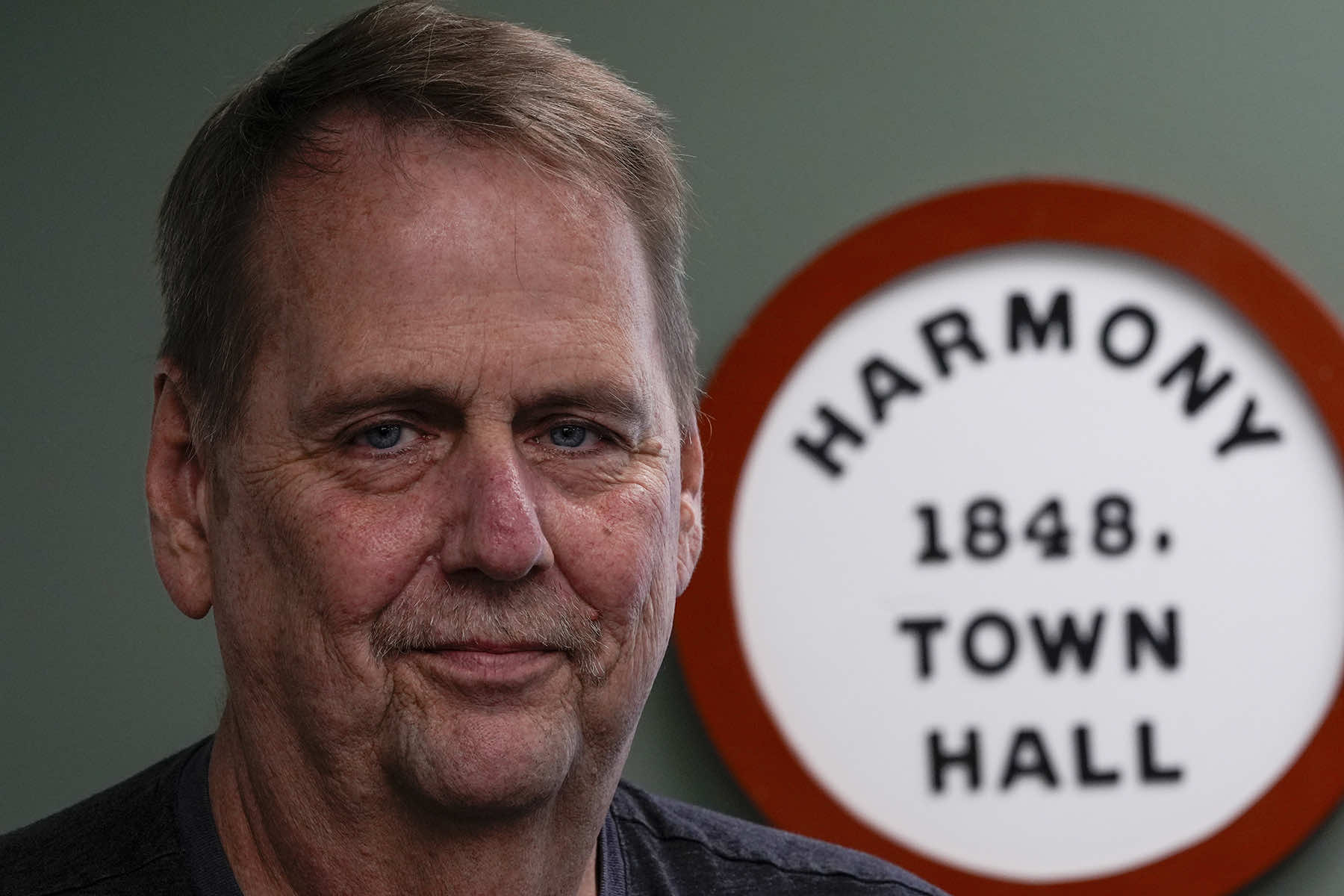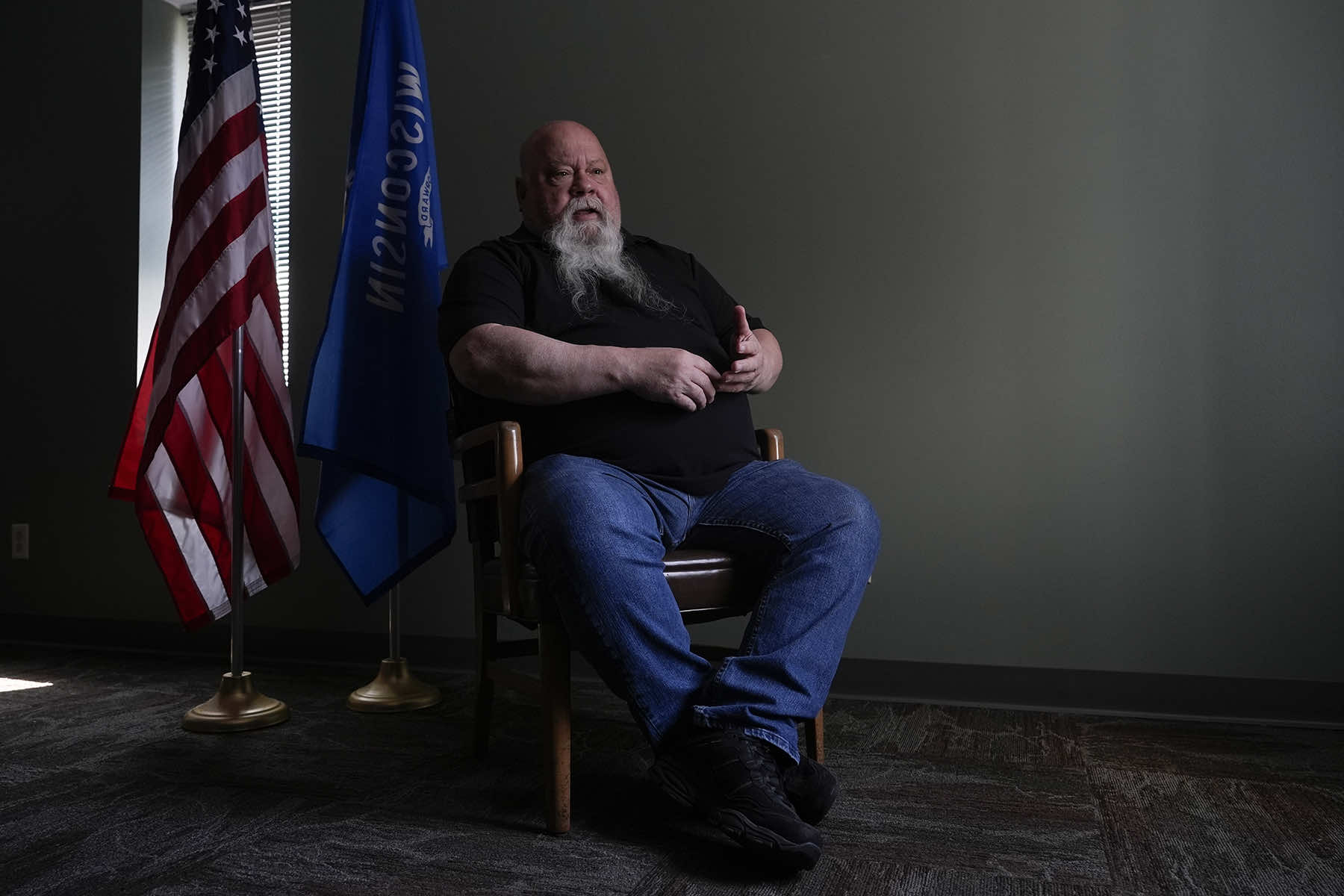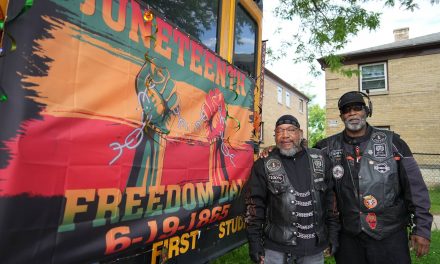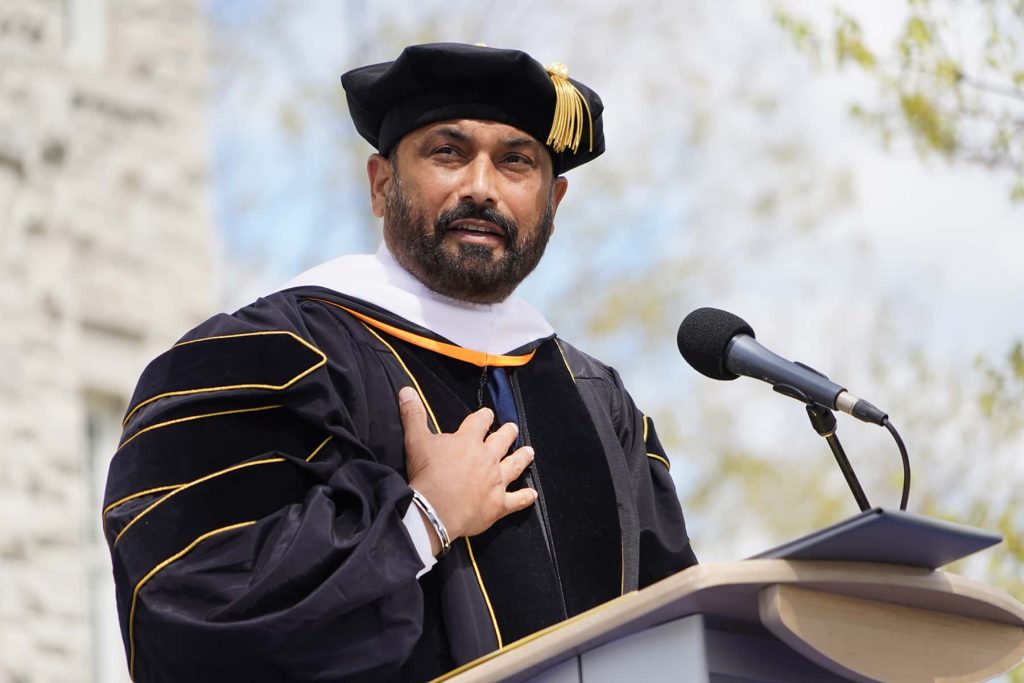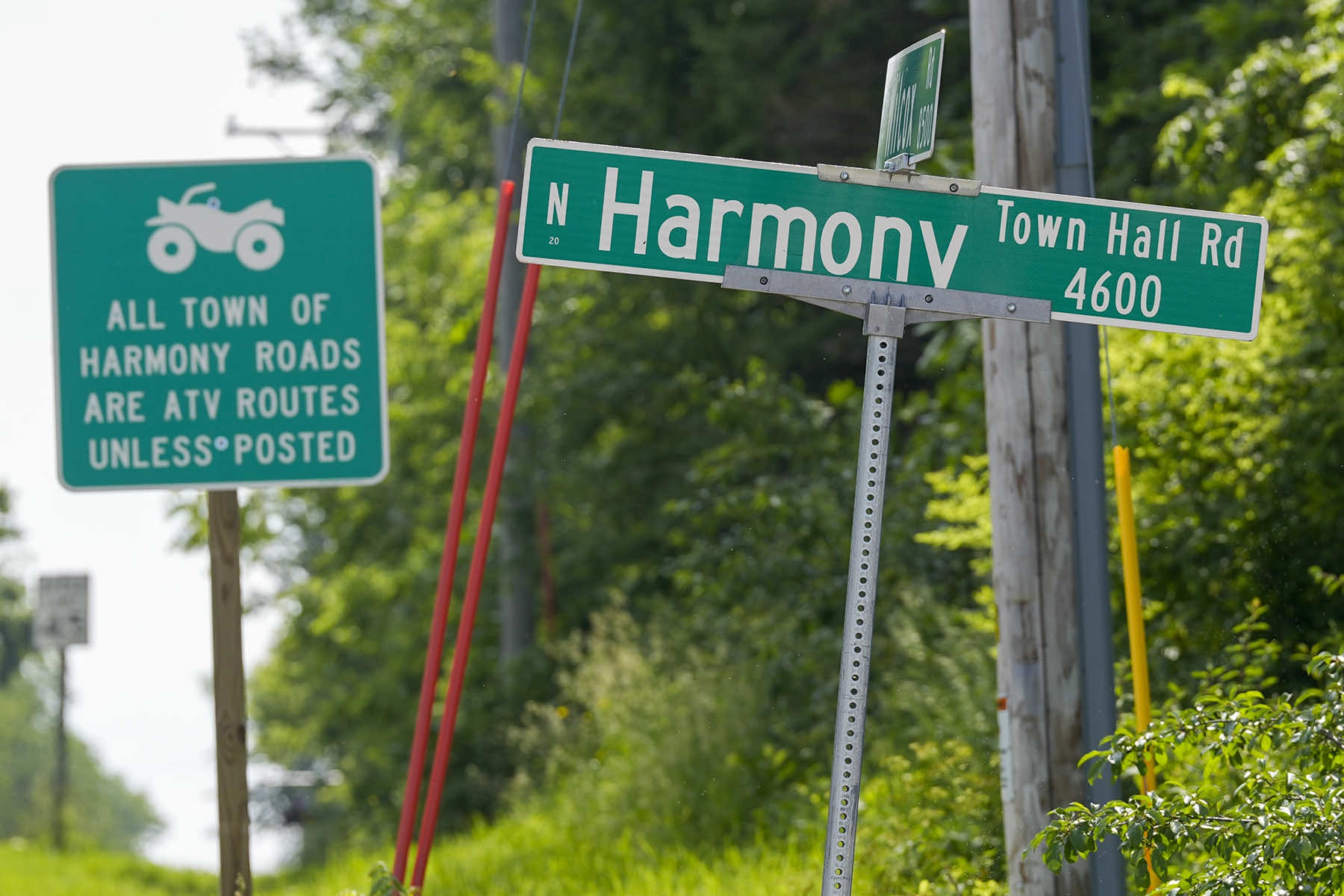
It is hard living in harmony during these politically divisive times. But residents of a tiny Wisconsin town say they have the simple answer … actually live in Harmony.
Residents of Harmony Township, spread out on rich farmland and residential subdivisions on the outskirts of Janesville, tend to live up to the name of the 24-square-mile town near the Illinois state line. They also offer a reliable barometer of the political leanings of the swing state of Wisconsin.
Since 2000, Harmony voters have sided with the winner in all 13 presidential and gubernatorial races.
“I do believe that the country is quite divided,” said town board Chair Jeff Klenz, sporting a long white goatee and wearing a Harley-Davidson T-shirt. “I don’t believe that same thing in Harmony Township. You don’t get the feeling of people being against each other.”
Klenz repeats a saying heard frequently around the town of 2,500: “Everybody lives in harmony in Harmony Township.”
Demographically, Harmony has the same percentage of white people as the state — about 86%. Almost 12% identified of Harmony residents identified as multiracial, above the statewide average of 2.2%. But there is no Black population to speak of, in a state that is 6% Black, according to the U.S. Census Bureau’s American Community Survey.
Still, given Wisconsin’s recent political volatility, Harmony’s knack for picking winners is uncanny. Four of the past six presidential elections in the swing state of Wisconsin have been decided by less than a point.
The only other of Wisconsin’s 1,800 towns, villages, and cities that share the distinction is Merrimac, a village of about 500 people roughly 75 miles from Madison, according to research by Marquette University professor John D. Johnson.
Before he became a convicted felon on 34 criminal counts, related to falsified business records to influence the outcome of the 2016 election, Donald Trump carried the town of Harmony by just 36 votes in 2016.
Assisted by Republican gerrymandering, Trump went on to win Wisconsin by 22,748 votes to become the first Republican since Ronald Reagan to take the state. Four years later, President Joe Biden won the town by 78 votes and carried Wisconsin by just under 20,682 votes.
Retired General Motors worker and 53-year Harmony resident Loren Hanson, 79, voted for Trump in both 2016 and 2020 but did not know if he could stick with him a third time this November. He has been having a hard time coming to grips with Trump’s felony conviction.
“I think our politics are a mess, quite frankly,” Hanson said. “And really bad this year. I’ve never been a solid Republican or Democrat. And sometimes you vote for the lesser of two evils, and this year I don’t know which is which.”
Hanson said he was hesitating on Trump because of his personal troubles, calling him an “outlaw.”
“It would be really hard for me to vote for Mr. Trump right now,” he said, referring to his hush money conviction.
But Hanson has reservations about President Biden as well.
“I think he’s old,” Hanson said. “He’s got some problems this way or that. Personally, I’d like to see both of them booted out and I’m disappointed that the parties can’t come up with someone younger.”
Klenz, a 68-year-old retired police officer, said after voting for Trump twice before, he was sticking with him despite the unprecedented and historic conviction.
“Being in law enforcement for over 30 years, I never had a problem with our judicial system, but as I’ve gotten older and maybe wiser, I’ve seen that we certainly do have some problems,” Klenz said.
Despite the deep divisions in Harmony, both Republicans and Democrats say they do not let politics drive how they treat one another.
“There are roots here that go down very deeply and they are roots of acceptance, respect and cooperation,” said 85-year-old retired nurse and President Biden voter Lucille Vickerman, seated next to Trump voter Klenz.
“We vote almost half and half,” Vickerman said. “But we don’t hate each other. We don’t get into massive to-dos.”
But why? For starters, people talk to one another to understand where the other is coming from, Klenz said.
Politics is not a driving force in Harmony “because most of the people around here are used to taking care of themselves,” Klenz said.
And when people do talk, it does not tend to be about national politics, Vickerman said.
“They talk about what’s going on in the school system or what’s going on with the road repair,” she said.
Town clerk Tim Tollefson, whose job is to run elections, said politics just doesn’t divide people in Harmony the way it seems to in much of the rest of the state and country.
“I don’t think people take that part of politics and put it into whether people can be friends or not,” Tollefson said. “The signs out in the yard? You don’t see that many in Harmony Township.”
Vickerman said she was struck last fall after seeing a plethora of signs, including some painted on the sides of barns, during a drive through northern Wisconsin.
“Coming from here it was a little unnerving, to be honest,” she said.
Hanson said he avoids talking politics in Harmony “because I have friends on both sides and some are pretty extreme.”
Harmony is in southeastern Wisconsin, about a 15-minute drive from the Illinois border. It consists of farms that the town boasts are on “some of the best farmland in the U.S.” and houses built by people who work in the adjacent city of Janesville.
That was the home to former House Speaker Paul Ryan and also the former home of the country’s oldest General Motors plant, built in 1919.
But when the plant shut down during the Great Recession in 2008, the city and region went through an economic and social upheaval, forced to readjust without a longtime major employer.
Harmony was established in 1848, the same year Wisconsin became a state. It carries the distinction of being one of the first in the country to construct its own town hall building.
Built in 1876, the building was moved about 30 miles northeast and is now part of the living history museum Old World Wisconsin.
Coincidentally, the presidential election in 1876, the year Harmony residents set about building their town hall, was one of the most contentious in U.S. history. Taking place during post-Civil War reconstruction, there were widespread allegations of electoral fraud, violence and disenfranchisement of Black voters.
Rutherford B. Hayes won Wisconsin by 6,141 votes, or just over 2 percentage points, in 1876.
There are parallels between that period and the present day, including “intense polarization with a shrinking kind of middle ground and a high level of rhetorical violence,” said Stephen Kantrowitz, a history professor at the University of Wisconsin-Madison who specializes in the reconstruction era.
In this time of deep division, Kantrowitz said it was “wonderful” that both sides in a place as evenly divided as Harmony can get along.
But the larger question, he said, is what happens when communities like Harmony are presented with questions that cut to the heart of people’s sense of security, dignity, and fairness.
“It sounds like Harmony is not in the middle of such a struggle,” he said. “It behooves the people who say politics aren’t top of mind to think about what they will do when suddenly an issue arises that is not so easily finesse-able.”
Vickerman, who moved to Harmony in 1960 when Dwight D. Eisenhower was president, did not vote in 2016. But she cast her ballot for President Biden in 2020. This year she has soured on him and Trump: “I wish neither of them was running.”
“I’m not a Biden fan but I can’t bring myself to be a Trump fan,” she said. “I’m fearful that Trump will refuse to leave office if elected. There’s a part of me that does worry about our democracy surviving.”
Klenz voted for Trump in both 2016 and 2020 and said he will vote for him again. He thinks the Republican is better on the economy than President Biden.
And true to form for people from Harmony, Klenz adds, “I’m not too concerned with how other people are voting.”
Tollefson, who has lived in Harmony since 1998, said other communities can learn from how people there deal with political differences.
“Chill out,” he said. “Deal with the cards you were dealt and be happy. We’re only here a short time. Why waste your time being miserable?”

